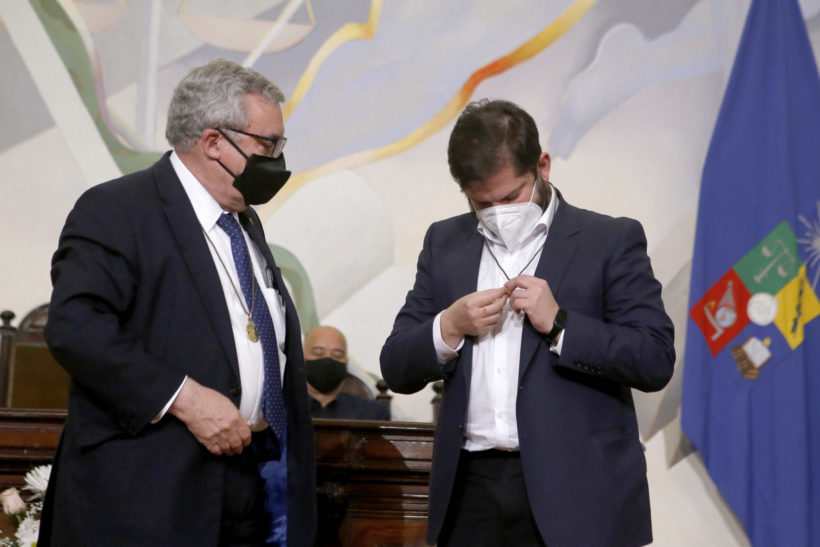In his first official appearance as Patron of the campus, the president also announced that the government is working to incorporate the U. de Chile Clinical Hospital into the public health network. “The first meeting of the commission to address this will be chaired by our Minister of Health and will be convened next week. We will take the floor,” he said.
Ennio Vivaldi, rector of the institution, referred to the need to redefine the concept of public university. “It is incredible the discussion about whether private universities should be considered public. I think this is not an issue of funding. The real effect is that, in the ambiguity, public universities cannot rebuild themselves as such. They want there to be no more public universities in Chile,” he said.
The political and academic world gathered this Wednesday 13 March at the University of Chile for the celebration of a new inauguration of the Academic Year of the campus. This year in particular, the debate on the definition of public education marked the speeches of President Gabriel Boric, and the president of the Constitutional Convention, Maria Elisa Quinteros, who were part of the event that took place in the Hall of Honour.
“It is a great joy for me to be at the Casa Central, which has been my home in many ways, and which is, above all, a house that is at the service of all of Chile,” began the President, who also announced the government’s intention to incorporate the Clinical Hospital of the campus into the public network. “This University has been an example of openness and contributions to the country, for example with its Clinical Hospital and its commitment, and with the generation of inputs and meetings regarding the constituent process. We are working to be able to include the HCUCH in the public care system this year,” he said, specifying that “the first meeting of the commission to address this will be chaired by our Minister of Health and will be convened next week. Let’s have the floor”.
Also, on the repositioning of the public sector, he said he was “very honoured to be Patron of the U. de Chile, and from this position I hope to help strengthen public education. The state must stop treating state universities as if they did not belong to the state”.
Meanwhile, Rector Vivaldi highlighted the current scenario of possibilities and changes, where public education must be repositioned. “It is incredible the discussion about whether private universities should be considered public. I think this is not an issue of funding. The real effect is that, in the ambiguity, the public ones cannot rebuild themselves as such. They want there to be no more public universities in Chile”.
“One of the consequences of making the concept of public universities ambiguous,” he continued, “is to facilitate the transfer of public goods and functions to the private sphere. Moreover, in order to appropriate and privatise public goods, private universities have the advantage of being able to negotiate quietly without being subject to the strict procedural rules that regulate public universities.”
Part of the Rector’s remarks covered some of the milestones of the last year of the campus, such as the restitution of the public television channel of the University of Chile – UChile TV – one of the many instances annulled by the economic model implemented during the dictatorship; The recent launch from Cape Canaveral of a satellite constellation developed by the University of Chile and the start-up of the Biotechnology and Vaccine Production Centre in Parque Carén, in conjunction with the Italian company Reithera, the company Cytiva, Nordika and Italfarmaco, which demonstrates the interest of the campus to contribute concretely to the development of science and technology in the country.
For her part, the president of the convention and U. de Chile graduate, María Elisa Quinteros, stated that “the role of public universities is fundamental in the socio-cultural, scientific and technological development of the population. The functions they perform are directly related to fostering critical thinking”. He added: “Today we are facing an unprecedented opportunity in our republican and democratic life, an opportunity that invites us to dialogue and reach a consensus on the role of these institutions for each region of the country and its communities, groups or collectives”. The meeting was attended by the Minister of Education, Marco Antonio Ávila; the Minister of Foreign Affairs, Antonia Urrejola; the Minister Secretary General of Government, Camila Vallejo; the Minister of Science, Technology, Knowledge and Innovation, Flavio Salazar, and the Undersecretary of Higher Education, Verónica Figueroa Huencho, among others.
The meeting is available here:










